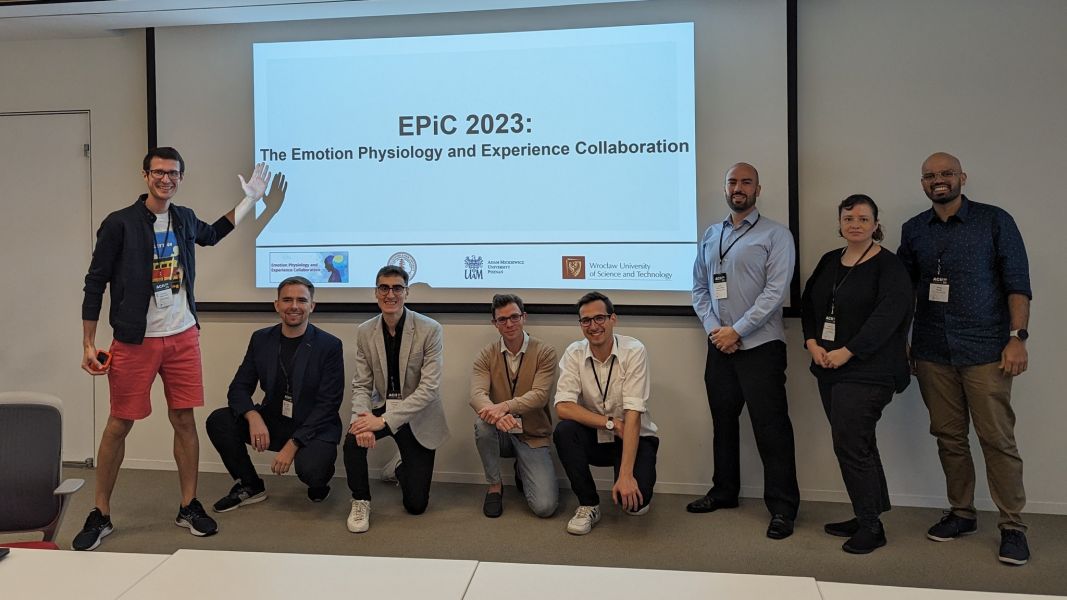In August/September, Dr Maciej Behnke from the Faculty of Psychology and Cognitive Science and Dr Nicholas Coles from Stanford University worked jointly on research ideas to help develop affective science. With the support from the Excellence initiative- Research University, they worked together in Poznan, Boston and Stanford, forming the main elements of a proposal for a ground-breaking grant.
- 'There are fascinating questions in the world of science requiring widening horizons and creative solutions,' says Dr Maciej Behnke. - 'Questions such as: Do people commonly experience physiological changes while experiencing emotions? How do stress, loneliness, and inequality affect the physiology of individuals worldwide?, needs an infrastructure for psychophysiological research to be globally distributed and standardised', explains Dr. M. Behnke.
Scientists began focusing on how to address these questions last year, including meeting in Berlin on the occasion of the presentation of The Einstein Foundation Award to Dr Nicholas Coles and the Psychological Science Accelerator, which he directs.
At the end of August, Dr Nicholas Coles visited Poznan, where various challenges and possible solutions for international research cooperation were discussed during a series of meetings. It inspired the researchers to visit the Emognition group from the Wrocław University of Technology, whose summit discussed, among other things, the policies and priorities of funders, making it challenging to fund international collaborations. During the visit to Poznan, Dr N. Coles retained the opportunity to learn about the opportunities and challenges of conducting psychophysiological research in Poland.
Subsequently, Drs Coles and Behnke met in Boston during the 2023 Affective Computing + Intelligence Interaction Conference. Along with the Emognition Team (Dr Stanislaw Saganowski and Bartosz Perz, M.Sc.), they organised a workshop called 'EPiC 2023: Emotion Physiology and Experience Collaboration'.
At the workshop, Prof. Lisa Feldman Barrett from Northeastern University gave a lecture entitled 'Re-evaluating Context: Population Thinking, Relational Realism and the Study of Emotion'. Following it, there was a discussion of the results of a challenge in which 15 teams made an action to use physiology to model two fundamental dimensions of emotion: valence and arousal. The talks at the conference allowed researchers to understand how affective informatics can contribute to answering crucial questions in affective science. The stay in Boston culminated in a grant consultation with Professor Lisa Feldman Barrett at Northeastern University in Boston.
The final stage of the intensive month-long collaboration involved Dr Maciej Behnke's trip to Stanford University. Courtesy of Professor James Gross, the researchers conducted a pilot study at Stanford's Psychophysiology Laboratory. It allowed the scientists to finalise the first draft of the grant proposal and discuss it in detail with Stanford colleagues.
- 'These four weeks were crucial in shaping a shared vision for the project,' says Dr Maciej Behnke. - 'During the process, we learned three fundamental things about globally distributed psychophysiological research. Firstly, we became aware of the enormous challenges they present. Second, we became convinced that they are feasible. Thirdly, we are both fully committed and determined to see this project fulfilled. We are immensely proud of what we have achieved so far. Whether or not we receive funding, we have built trust, set valuable contacts, and strengthened cooperation between our research facilities. It allows us to look optimistically to the future of affective science, which promises to be extremely exciting,' adds the AMU scientist.






